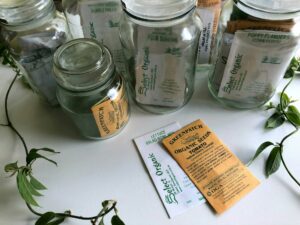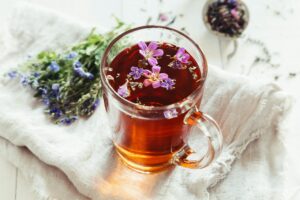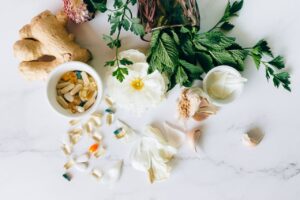Common Side Effects of Taking Too Many Herbal Supplements

Common Side Effects of Taking Too Many Herbal Supplements
Herbal supplements have become very popular as more and more people look for natural ways to boost their health, energy, and immune systems. People often say that herbs are safe alternatives to modern medicine. Some people say that ginseng gives them more energy, and turmeric is used to lower inflammation.
But even though herbs have a lot of benefits, using them too much can cause unwanted side effects. If you use herbal supplements too much or in the wrong way, they could hurt your body instead of helping it, just like any other chemical.
This article talks about the most common bad effects that can happen when you take too many herbal supplements and how to use them safely.
Why Taking Too Many Herbal Supplements Can Be Dangerous
- Supplements are much stronger than fresh herbs, and they come in concentrated doses.
- Not enough rules: Many herbal products don’t go through strict testing for purity or dosage.
- Some plants might interact with prescription drugs, which is something to keep in mind.
- Responses vary from person to person. Age, health, and family history can all affect how someone reacts.
1. Issues with the Digestive System
- Some herbs can irritate the stomach and intestines if you use them too much.
- Too much peppermint can cause acid reflux, and too much aloe vera can cause diarrhea.
- Some of the signs are nausea, bloating, stomach cramps, diarrhea, or constipation.
2. Stress on the liver and kidneys
- The liver and kidneys process most of the things we eat, including herbs. If you use these organs too much, they might get too full.
- On the other hand, too much kava can hurt the liver, and too much green tea extract can also be bad for the liver.
- You might feel tired, have yellow skin, dark urine, or stomach pain.
3. Allergies Can Cause Reactions
- Natural herbs can even cause allergic reactions in people who are sensitive to allergens.
- Echinacea, for example, can cause rashes, and chamomile can cause reactions in people who are sensitive to ragweed.
- Depending on how bad the condition is, symptoms can include skin irritation, itching, hives, swelling, or trouble breathing.
4. Hormonal Disharmonies
- Some plants can mimic or change the hormones in the body. Taking too much could throw off the natural balance of hormones.
- For example, using too much fenugreek or licorice root could change the levels of estrogen or cortisol.
- Some of the signs are mood swings, water retention, and periods that don’t happen on time.
5. Problems with the Sleeping Process
- Some herbs can calm you down, while others can make your nervous system too active.
- For example, too much ginseng or guarana can make you feel anxious.
- Some of the signs are not being able to sleep, feeling anxious, being irritable, or having headaches.
6. What it does to your heart and blood pressure
- Some herbs can have a bad effect on circulation and heart rate when taken in large amounts.
- Taking too many garlic supplements could make the blood thinner, while ginseng could make blood pressure go up.
- Some of the symptoms are dizziness, an irregular pulse, nosebleeds that happen often, and blood pressure that is either too high or too low.
7. Drug Interactions and Things You Shouldn’t Do
- One concern that is often ignored is how herbs affect prescription drugs.
- The effectiveness of birth control pills and antidepressants is reduced when St. John’s Wort is administered.
- The symptoms are either a decrease in the effectiveness of drugs or an increase in their side effects.
8. Bad Effects on the Nervous System
- Certain herbs may have an effect on how the brain and nervous system work. If you use it too much, it could overstimulate or sedate your body.
- For example, too much valerian root can make you sleepy, while too much caffeine-rich plants (like guarana) can make you jittery.
- Some of the signs are anger, confusion, shaking, or worry.
9. How the skin reacts
- Some herbs can irritate the skin if you eat too much of them or put them on your skin.
- For example, too much tea tree oil can cause rashes or a burning feeling.
- Some of the signs and symptoms are blisters, redness, itching, and dryness.
10. Vitamins and minerals are not evenly spread out.
- Taking too much of some herbal extracts could throw off the body’s nutritional balance.
- Taking too much spirulina or chlorella, for example, can cause a lot of iron to build up in the body.
- The symptoms are tiredness, joint pain, or pain in the stomach.
How to Safely Use Herbal Supplements
- Don’t change the dose that is written on the label.
- Before using herbs with prescription drugs, you should talk to a doctor.
- Start with a small amount to see how much you can handle.
- Pick high-quality supplements that have been tested to avoid contamination.
- It is better to switch between different herbs when you eat a lot of one plant.
Even though herbal supplements may be good for your health, “natural” doesn’t always mean they are safe. They can cause digestive problems, strain on organs, allergic reactions, and even dangerous interactions with other drugs when taken in large amounts.
Moderation, being aware, and having professionals watch over you are the most important things. You can get the benefits of these plants without putting your health at risk if you know about the possible side effects and understand how powerful herbs can be.







